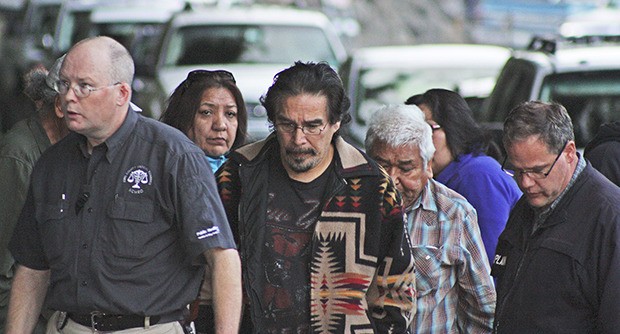Family and friends of Misty Upham have criticized the Auburn Police Department for what they described as its lack of cooperation with the search that ended with the discovery of the missing actress’s body.
The King County Medical Examiner confirmed on Friday that the woman’s body found down a wooded ravine in southeast Auburn was that of Upham, a 32-year-old Native American woman missing since Oct. 5.
Upham’s cause and manner of death remain under investigation. A medical examiner’s office investigator said that Upham (inset photo) died on Oct. 5.

Auburn Police said Friday they did not have any evidence or information to believe that there was foul play.
Upham, a member of the Blackfeet Nation, was last seen walking away from her sister’s apartment, according to a statement her father, Charles Upham, sent to media outlets after his daughter’s disappearance. The family filed a mission person report Oct. 6.
Mr. Upham said in that release that even though his daughter suffered from bipolar disorder and bouts of anxiety and depression, he did not believe she would hurt herself.
In a statement posted on Facebook, the family said: “We believe she ran into the wooded area behind her apartment to hide from the police. The area in question has a hidden drop off and evidence suggests that she slipped and fell off of the steep embankment when she tried to get out of a view from the road. She simply did not see the drop off.”
The family said that Misty Upham was afraid of the Auburn Police because of an incident before her disappearance in which officers allegedly mistreated her. They also argue that Auburn Police could have been much more helpful after she went missing.
“Police refused to help, they did not help, they did not find her today,” said Tracy Rector, a director, a friend of Misty Upham’s for 10 years and a member of the search effort. “It was through the efforts of the family and the Native community that her body was found. The family really wants to make clear that they repeatedly asked for help, and the police did not help at all. There were various issues police brought up,” Rector said, among them the limited resources at their disposal.
Auburn Police Cmndr. Steve Stocker defended the department’s effort.
“We had a missing person report on file from Oct. 6. We had it assigned to a detective. Our investigation division was working on it as a missing person case,” Stocker said. “We had been in contact with friends and family. Any leads that we got, the detectives followed up on them. And we had some leads that had nothing to do with anything in this area that detectives were following up on when the call came in today.
“We were doing everything we thought was right in a situation like this, based on the information we had,” Stocker said.
On Thursday a search team looking for Upham off Elm Lane and 28th Street Southeast found her purse and identification in the brush. Team members then tied a rope to a tree, scaled the 150-foot vertical drop into the ravine and found the body.
Valley Regional Fire Authority crews spent Thursday afternoon working their way down the hill with ropes and pulleys to recover Upham’s body and bring it back to street level. After Dr. Timothy Williams of the King County Medical Examiner’s Office completed a quick, on-site examination, he talked to family friends and led to his van a large group, which held an impromptu service for the dead woman.
Misty Upham, who grew up in the Auburn area, had recently returned from Los Angeles to support her parents, who were struggling with serious health issues.
In 2008 she was nominated for an Independent Spirit Award for her role in the film “Frozen River,” in which she co-starred with Melissa Leo. She played a housekeeper in “August: Osage County,” which starred Julia Roberts and Meryl Streep.
Rector described her friend.
“Misty was a person very dedicated and very passionate about the arts,” Rector said. “As an actress, she understood that her work was about more than making films. It was about breaking the glass ceiling for other Native actors. It was about helping any creative Native person who needed a role model to understand that, if they followed their passion and worked hard, there was a possibility they could achieve their goals.
“She spoke a lot to native youth and did a lot of charity work,” Rector added, “and she spoke from personal experience about working hard. So this was very much out of character for her to disappear, and the family knew immediately that something was wrong.”
Upham launched her acting career in Seattle with Red Eagle Soaring, a Native youth group, and mentored young people at Long House Media, a filming organization for native youth.
“She probably achieved more than any Native actress has in terms of recognition and for paving the way for Native people in Hollywood,” Rector said.

